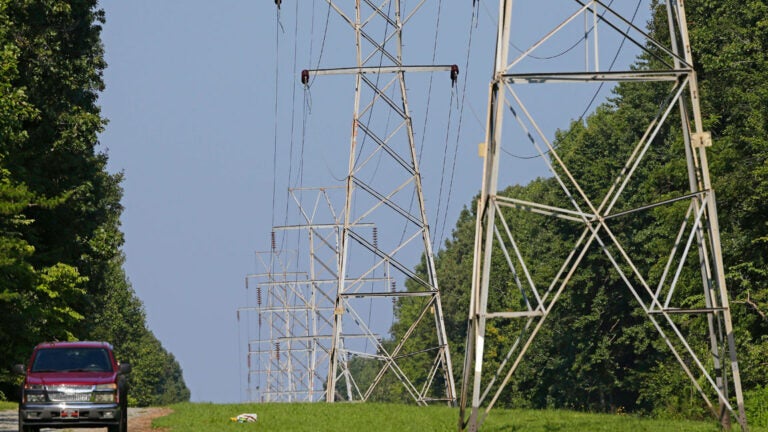Fierce debate over N.J.’s clean-energy goals centers on possible abandonment of regional power grid
Currently, state buys power on PJM capacity market. Critics want New Jersey to go it alone.

Power lines are pictured in a file photo. (AP Photo/Gerry Broome)
This story originally appeared on NJ Spotlight.
___
Will the state’s clean-energy goals be more readily achieved by remaining in the regional power grid or by bolting it out of fear that staying — along with certain federal policies — could undermine efforts to combat climate change?
That issue is the crux of an intense debate over how New Jersey should respond to policy changes by the regional power grid, PJM Interconnection and the Federal Energy Regulatory Commission, in how states go about procuring the electricity they need to keep the lights on for both residents and businesses.
Critics say those policies undermine state efforts to pursue cleaner sources of energy to reduce impacts of climate change. Twenty-nine states — including New Jersey and nine other states in the PJM grid — have adopted policies to promote clean energy by setting aggressive goals to decarbonize the energy sector.
In response, the state Board of Public Utilities has opened a proceeding to determine whether it could achieve the state’s climate goals — 100% clean energy by 2050 — by exiting PJM’s capacity market, where it buys enough power to supply customers no matter how high the demand for energy mounts.
Many participants at a state webinar Monday argued against abandoning what has been a successful regional approach to buying power, a framework that has led to savings for energy consumers and increased reliability of the power grid.
“The best path for states is to remain in the wholesale competitive markets,’’ said Jeff Dennis of Advanced Energy Economy, a trade group representing energy companies in the clean-energy sector.
For and against going it alone
But Lathrop Craig of PSEG Power Ventures argued the only way for New Jersey to pursue its clean-energy goals is to exit the PJM capacity market and set up its own system of buying power — a system known as Fixed Resource Requirement (FRR).
PSEG and Exelon have proposed such a system to the BPU, saying it could cut costs to consumers by hundreds of millions of dollars a year while allowing increased procurement of renewable energy sources. If adopted, the companies would give up nuclear subsidies that cost consumers $300 million annually.
That view is questioned by Joseph Bowring, the independent market monitor for PJM. “The PS(EG) proposal for FRR amplifies ZECs (zero emission credits) and significantly so,’’ he said. The ZECs are subsidies awarded by New Jersey to the three nuclear units in South Jersey to avoid their closing by the BPU.
Others, however, backed the PSEG/Exelon proposal, saying it is the only viable way to get around the new policy changes initiated by FERC.
“These are hard issues,’’ said Rob Gramlich, founder of Energy Grid, LLC, a company that advises energy firms on decarbonizing the grid. Because of policies set up by FERC and PJM, he said, “Unfortunately, FRR is the only option.’’
Others suggested that PJM needs to reform its policies, saying they no longer address the mix of new cleaner energy technologies emerging on the grid in response to climate change.
“I’ve come to believe the inescapable conclusion, capacity markets are outdated, and can no longer be an effective means to reflect state climate policies,’’ said Scott Weiner of SAW Associates, and a former president of the BPU. Weiner called on the state to establish a clean-energy standard (CES), a proposal that gives priority to clean-energy sources in choosing what kind of power to produce.
Others cautioned the state should move slowly in deciding what option to pursue.
“We’ve got to get this right. This is a big deal for New Jersey,’’ said Glen Thomas of the PJM Providers Group, and a former state utility commissioner in Pennsylvania. “The risk of getting this wrong is enormous.’’
WHYY is your source for fact-based, in-depth journalism and information. As a nonprofit organization, we rely on financial support from readers like you. Please give today.






